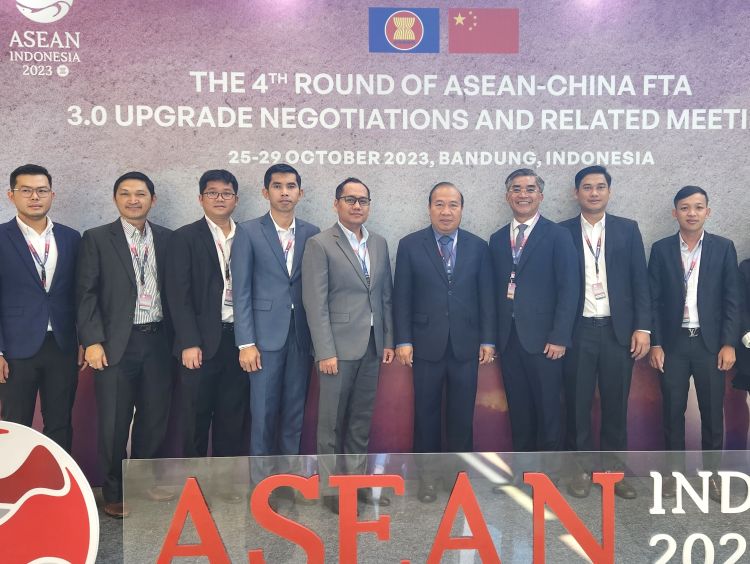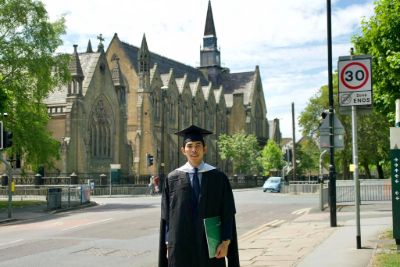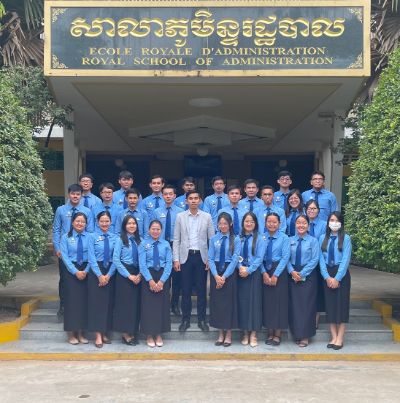School of Law Alum is Shaping Cambodia's International Trade Landscape

Bridging academia and real-world impact, alumnus of the University of Leeds School of Law is making significant contributions to Cambodia's international trade development.
Born in a country marked by years of civil wars, Bunthorn Sok (International Trade Law LLM, 2020) is passionate about contributing to Cambodia's legal architecture, especially in the realm of international trade development. Since achieving peace in 1998, Cambodia has undergone a significant economic transformation, paving the way for likely graduation from its Least Developed Country (LDC) status by 2027. Nevertheless, graduating from a LDC status will also bring about important legal considerations to the country.
In this context, Bunthorn viewed the LLM in International Trade Law at the School of Law as an opportunity to prepare himself to support his country in securing sustainable trade agreements, both before and after LDC graduation, and to participate in Free Trade Agreement (FTA) negotiations, where expertise in international trade law is critically needed. He says,
The LLM in International Trade Law course incorporates highly relevant subjects to international trade development. These include international economic laws, the laws of the World Trade Organization (WTO), international investment law, legal research, ADR, e-commerce Law, competition Law, and many others. All these subjects have been at the forefront of the WTO’s agenda for decades and gaining importance in developing countries like Cambodia.
As a recipient of the prestigious Chevening Scholarship, Bunthorn assessed various UK universities before ultimately selecting the University of Leeds. The School of Law's contemporary and comprehensive International Trade Law course was a primary factor in his decision. Furthermore, the School's rich legacy of nurturing renowned academics, practitioners, politicians, along with its membership in the Russell Group, further solidified his choice.
Reflecting on his time at the School of Law, Bunthorn emphasizes the impact it had on his life after graduation. Equipped with expert knowledge in international trade, he has undertaken several key roles in his home country since his departure from the School. These responsibilities include joining international trade negotiations for Cambodia, including FTAs between Cambodia-South Korea, Cambodia-United Arab Emirates, and the Association of Southeast Asian Nations (ASEAN)-China FTA 3.0 upgrading. He has also been involved in legal research, particularly ensuring Cambodia's compliance with WTO regulations.
Simultaneously, Bunthorn contributes to trainings for government officials. This includes economic and commercial diplomacy training for Cambodia’s newly appointed diplomats at the Ministry of Foreign Affairs and International Cooperation, who require such skills for effective oversea missions. In addition, he frequently participates in local TV interviews, particularly covering significant global events. Some noteworthy examples include the historic Trump-Kim Jong UN meeting in 2018, the WTO’s Aid for Trade event in 2019, the economic focus on the Ukraine War in 2022, and, most recently, Cambodia’s new Prime Minister's historic participation in the World Economic Forum and the Republic of France, both in January 2024.

Bunthorn has also maintained his involvement in the academic sphere. A year after leaving the School, he assumed the position of lecturer in Commercial and Economic Diplomacy at the École Royale d'Administration (ERA), the highest government-run institution for training senior-official students. He also accepted a part-time lectureship in international trade law at the Institute of International Studies and Public Policy (IISPP-RUPP). Taking up these roles at such renowned institutions fulfilled a long-awaited goal.
It has been an exciting experience to assume this respected role at a renowned school where I once dreamed of being a trainee. Additionally, the knowledge gained from the School of Law has elevated my part-time lectureship to new heights.
Naturally, Bunthorn’s journey has also presented challenges. Primary hurdles include unforeseen issues or assignments, particularly when certain trade matters are affected by external factors such as food security or interstate conflicts. Nevertheless, he adeptly manages and overcomes these challenges by harnessing his ability to critically assess conflicting laws and policy frameworks. Additionally, he emphasizes the significance of being able to work flexibly within hierarchies and procedures, adapting to various contexts, as a crucial factor in overcoming challenges.
Now serving as the Deputy Director-General for International Trade in Cambodia’s Ministry of Commerce, Bunthorn oversees the notification and legal compliance department. His primary responsibility is to ensure Cambodia's adherence to its WTO commitments and related rules. Additionally, he provides legal counsel to leaders on trade measures, handles ASEAN+1 affairs, and actively participates in trade dialogues and negotiations, including the recent ASEAN-China FTA upgrading. Furthermore, he contributes legal insights to inter-ministerial groups such as the Legal and Policy Advisory Group for National Single Window as well as the technical working group tasked with preparing Cambodia’s Human Rights Report for the United Nations. Both groups play crucial roles in informing the Royal Government’s decisions.
In offering guidance to students interested in entering the field of international trade law, Bunthorn recommends several key steps. First, he suggests a thorough study of critical analyses of WTO laws, with a focus on key provisions such as the General Agreement on Tariffs and Trade (GATT 1947) and the post-Marrakesh Agreement 1995. Second, staying informed about global trade developments, including events like India’s rice export ban, the US-China trade war, debates on WTO reform, and legal justifications in various trade disputes. Third, he emphasizes the importance of actively engaging with professors, seeking guidance, and leveraging their high expertise. Lastly, he suggests applying for roles at government institutions or arbitration bodies post-graduation to gain hands-on experience and bridge the gap between theory and practice.
In the future, Bunthorn envisions a continued commitment to contributing to Cambodia's trade policy and development. His focus is on securing Cambodia's international trade benefits post-LDC graduation and nurturing a future generation of professionals passionate about international trade.




